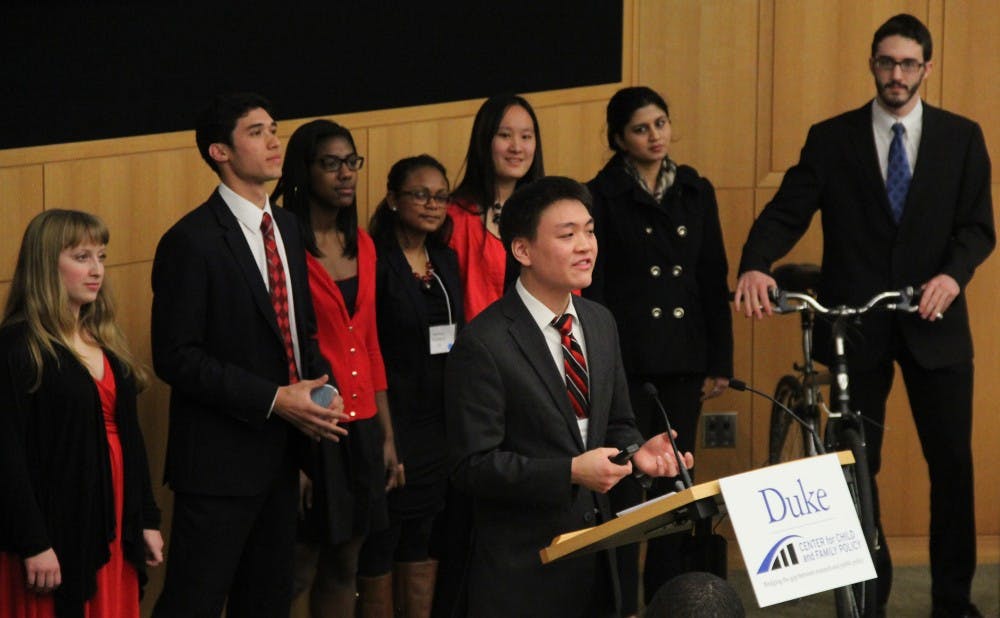While many undergraduates were preparing to move in for the Spring semester, 100 students contemplated solutions to educational challenges in India and the United States.
This year’s Winter Forum, titled Rethink Education: The Innovation Challenge, featured speeches from two former North Carolina governors—Jim Hunt and Bev Perdue. The three-day forum—hosted by the Center for Child and Family Policy at the Fuqua School of Business—allowed students to work with experts in education to create proposals to eliminate common problems in the field. At its conclusion Tuesday, groups of about eight students presented their solutions and winning teams were announced.
“Globally, it is an important time in education. We are facing an opportunity to really push the forefront of innovation in education both in the United States and in India,” said forum coordinator Leslie Babinski, a research scientist at the Center for Child and Family Policy.
Sophomore Wendy Burr’s team focused on the issues that plague the Indian educational system. The team highlighted the low graduation rates and the one to 47 teacher-to-student ratio as large setbacks to the success of Indian education.
The group presented their system for improvement, TARA—the Hindi word for star. TARA is an acronym for teach, apply, retain and achieve. Much of the current learning focuses on memorization, Burr said, but it is through problem-based learning that students actually gain knowledge and master materials.
These problems are not exclusive to India, Burr added.
“Both the U.S and the Indian education systems focus a lot of time on just ensuring students pass end of the year tests,” she said.
Every group that discussed India emphasized the problems with memorization dominating the classroom.
“In India, the poorest 20 percent have an average of 4.2 years of education,” said senior Leilani Doktor, whose group developed a system for improvement called Project Roots.
Many students are pulled out of school by their parents who need them to work for additional family income, she added.
The forum attracted students from a variety of campus backgrounds—some were studying education and had already participated in DukeEngage programs that focus on education. Others, however, had no previous experience in issues of education. For some, like sophomore Eshita Singh, the problem of education in India is a very personal issue.
Singh recalled the monotonous memorization she faced during primary school in India, which led her to hate school.
Babinski noted that a major success of this year’s forum was its ability to draw students from across the campus.
“I was excited to see it was appealing to students from different years, different disciplines and different majors,” she said. “It wasn’t just the education students who thought this topic was important.”
Senior Natalie Ferguson’s group focused on domestic educational issues by proposing solutions for underperforming low income students. The group emphasized the untapped possibilities of Massive Open Online Courses for elementary learning.
The group suggested that by allowing elementary students to create educational videos based on real-world applications of classroom materials, students essentially become MOOC teachers. This would allow students to learn through teaching, and other students to learn through watching in a way that they can understand.
“We are creating a YouTube-like online database of videos created by students, for students,” Ferguson said.
Other groups targeted the prevalence of the summer slide—the phenomenon in which students lose a large part of their learning because of the lack of academic stimulation during the summer months—in Durham. Among the variety of suggestions, students suggested having summer programs to keep kids intellectually engaged with school is out of session.
Three groups were selected by a panel of judges to receive money for the nonprofit of their choice. The group that placed third was also selected as the “audience favorite.”
The four judges were selected because of their experience in the field of education innovation. Katherine Haley, Trinity ‘00, is the assistant to the speaker for policy for education, workforce and social policy issues. Mandeep Dhillon, Trinity ’92, founded Togetherville, an online social community for families. Kim Hanauer, Trinity ’02, is the director of college and career readiness at Knowledge Is Power Program Through College. Stacy Parker-Fisher is the head of the learning differences program at the Oak Foundation, which addresses issues of global and environmental concern.
Parker-Fisher said that many of the proposals were up to the standard of those that she reviews professionally, saying that they were “all winners.”
The People’s Choice Award went to a team called Gearing Up, who also won the third place overall award. Hanauer noted that the group’s bike-based learning style could be translated globally.
The second place winner was Learning is my Job, which advocated for paying students in India to tutor younger learners. Haley noted that the group not only improved the classroom setting, but also allowed for young students to have mentors.
The winner of the winter forum was a team that connected students in India with those in the U.S., titled StemPals.
“Of all of the winter forums, this seems to be the one that students were most in to,” said President Richard Brodhead. “And that makes me happy.”
As the fifth annual winter forum, this year attracted more than 200 applicants for only 100 possible spaces, said Alison Jones, communications director at the center for child and family policy.
Throughout the forum, students attended a variety of lectures from experts and meetings with faculty mentors.
Amid the many speeches, on Sunday the students heard from the founder of the Global Fund for Children, Maya Ajmera, that focused on the global responsibility to educate young people. She explained that all people will, at some point, realize a moment in which they are obligated to help make a change in the future of others.
“How are you going to recognize your moment of obligation when it comes?” Babinski asked the students, referencing Ajmera’s speech.
Get The Chronicle straight to your inbox
Signup for our weekly newsletter. Cancel at any time.

